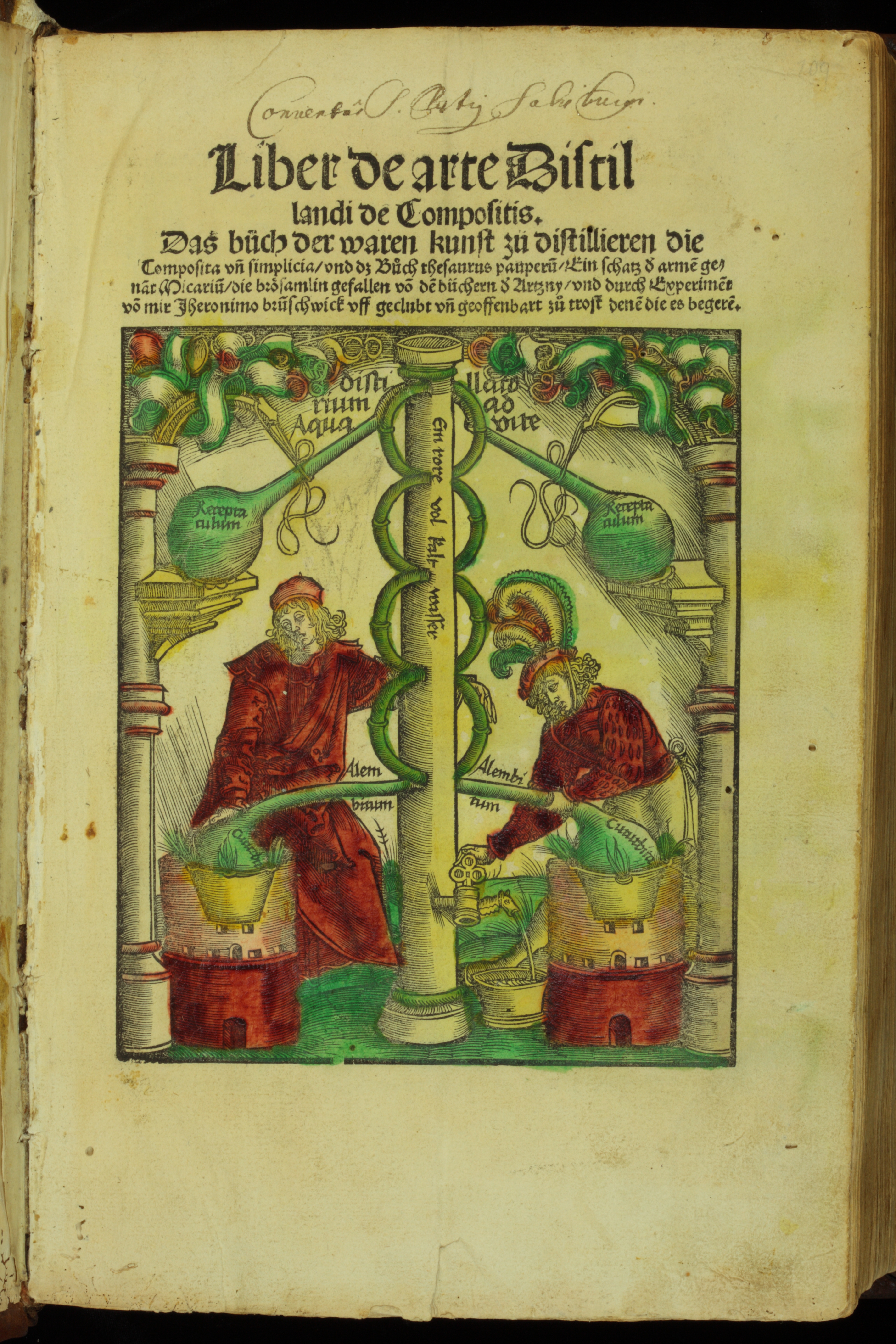Aqua vitae on:
[Wikipedia]
[Google]
[Amazon]
 ''Aqua vitae'' (
''Aqua vitae'' (
p. 32.
/ref> Examples include
"Aqua vitae" definition
fro
TheFreeDictionary.com
Distilled drinks Alchemical substances {{distilled-drink-stub it:Acquavite
 ''Aqua vitae'' (
''Aqua vitae'' (Latin
Latin ( or ) is a classical language belonging to the Italic languages, Italic branch of the Indo-European languages. Latin was originally spoken by the Latins (Italic tribe), Latins in Latium (now known as Lazio), the lower Tiber area aroun ...
for "water of life") or aqua vita is an archaic name for a strong aqueous solution
An aqueous solution is a solution in which the solvent is water. It is mostly shown in chemical equations by appending (aq) to the relevant chemical formula. For example, a solution of table salt, also known as sodium chloride (NaCl), in water ...
of ethanol
Ethanol (also called ethyl alcohol, grain alcohol, drinking alcohol, or simply alcohol) is an organic compound with the chemical formula . It is an Alcohol (chemistry), alcohol, with its formula also written as , or EtOH, where Et is the ps ...
. These terms could also be applied to weak ethanol without rectification. Usage was widespread during the Middle Ages
In the history of Europe, the Middle Ages or medieval period lasted approximately from the 5th to the late 15th centuries, similarly to the post-classical period of global history. It began with the fall of the Western Roman Empire and ...
and the Renaissance
The Renaissance ( , ) is a Periodization, period of history and a European cultural movement covering the 15th and 16th centuries. It marked the transition from the Middle Ages to modernity and was characterized by an effort to revive and sur ...
, although its origin is likely much earlier. This Latin term appears in a wide array of dialectical forms throughout all lands and people conquered by ancient Rome. The term is a generic name for all types of distillates, and eventually came to refer specifically to distillates of alcoholic beverages
Drinks containing alcohol are typically divided into three classes—beers, wines, and spirits—with alcohol content typically between 3% and 50%. Drinks with less than 0.5% are sometimes considered non-alcoholic.
Many societies have a di ...
(liquor
Liquor ( , sometimes hard liquor), spirits, distilled spirits, or spiritous liquor are alcoholic drinks produced by the distillation of grains, fruits, vegetables, or sugar that have already gone through ethanol fermentation, alcoholic ferm ...
s).
''Aqua vitae'' was typically prepared by distilling wine
Wine is an alcoholic drink made from Fermentation in winemaking, fermented fruit. Yeast in winemaking, Yeast consumes the sugar in the fruit and converts it to ethanol and carbon dioxide, releasing heat in the process. Wine is most often made f ...
and in English texts was also called ardent spirits, spirit of wine, or spirits of wine, a name that could be applied to brandy
Brandy is a liquor produced by distilling wine. Brandy generally contains 35–60% alcohol by volume (70–120 US proof) and is typically consumed as an after-dinner digestif. Some brandies are aged in wooden casks. Others are coloured ...
that had been repeatedly distilled.
The term was used by the 14th-century alchemist John of Rupescissa, who believed the then newly discovered substance of ethanol to be an imperishable and life-giving "fifth essence" or '' quintessence'', and who extensively studied its medical properties.
''Aqua vitae'' was often an etymological
Etymology ( ) is the study of the origin and evolution of words—including their constituent units of sound and meaning—across time. In the 21st century a subfield within linguistics, etymology has become a more rigorously scientific study. ...
source of terms applied to important locally produced distilled spirits. Artemas Ward, "Aqua Vitae" ''The Grocer's Encyclopedia''p. 32.
/ref> Examples include
whiskey
Whisky or whiskey is a type of liquor made from Fermentation in food processing, fermented grain mashing, mash. Various grains (which may be Malting, malted) are used for different varieties, including barley, Maize, corn, rye, and wheat. Whisky ...
(from the Irish '' uisce beatha''), ''eau de vie
An ''eau de vie'' ( French for spirit, §16, §17 ) is a clear, colourless fruit brandy that is produced by means of fermentation and double distillation. The fruit flavor is typically very light.
In English-speaking countries, ''eau de vie ...
'' in France, ''acquavite'' in Italy, '' akvavit'' and in Scandinavia, ''okowita'' in Poland, оковита (''okovyta'') in Ukraine, акавіта (''akavita'') in Belarus, and яковита (''yakovita'') in southern Russian dialects.
See also
*Alchemy
Alchemy (from the Arabic word , ) is an ancient branch of natural philosophy, a philosophical and protoscientific tradition that was historically practised in China, India, the Muslim world, and Europe. In its Western form, alchemy is first ...
*'' Aqua fortis''
*''Aqua regia
Aqua regia (; from Latin, "regal water" or "royal water") is a mixture of nitric acid and hydrochloric acid, optimally in a molar concentration, molar ratio of 1:3. Aqua regia is a fuming liquid. Freshly prepared aqua regia is colorless, but i ...
''
* History of ethanol
*Vodka
Vodka ( ; is a clear distilled beverage, distilled alcoholic beverage. Its varieties originated in Poland and Russia. Vodka is composed mainly of water and ethanol but sometimes with traces of impurities and flavourings. Traditionally, it is ...
References
External links
"Aqua vitae" definition
fro
TheFreeDictionary.com
Distilled drinks Alchemical substances {{distilled-drink-stub it:Acquavite